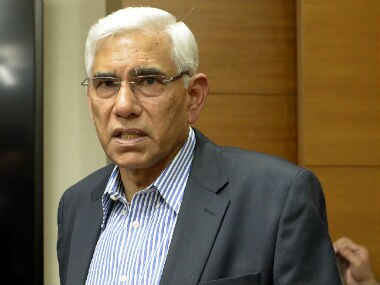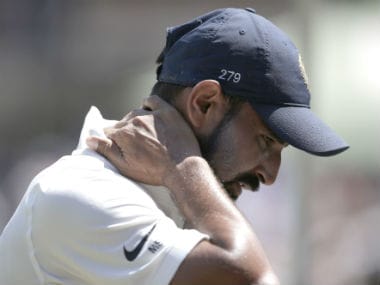Allowing Vinod Rai-led CoA to control BCCI with no checks will spell disaster for Indian cricket
The Vinod Rai-led CoA was appointed by the apex court to help the BCCI implement the Lodha panel recommendations, not resort to day-to-day administrative functioning of the BCCI.
Vedam Jaishankar, March 16, 2018
- Pakistan Super League, 2018 QG Vs IU Islamabad United beat Quetta Gladiators by 6 wickets
- Pakistan Super League, 2018 PZ Vs KK Peshawar Zalmi beat Karachi Kings by 44 runs
- Pakistan Super League, 2018 QG Vs LQ Lahore Qalandars beat Quetta Gladiators by 17 runs
- Pakistan Super League, 2018 MST Vs IU Islamabad United beat Multan Sultans by 33 runs
- Pakistan Super League, 2018 KK Vs LQ Karachi Kings tied with Lahore Qalandars (Lahore Qalandars win Super Over by 3 runs)
- Pakistan Super League, 2018 PZ Vs QG Quetta Gladiators beat Peshawar Zalmi by 6 wickets
- Pakistan Super League, 2018 MST Vs KK Karachi Kings beat Multan Sultans by 63 runs
- Pakistan Super League, 2018 PZ Vs IU Islamabad United beat Peshawar Zalmi by 26 runs
- Pakistan Super League, 2018 MST Vs LQ Lahore Qalandars beat Multan Sultans by 6 wickets
- Nidahas Tri-Series, 2018 SL vs BAN - Mar 16th, 2018, 07:00 PM IST
- ICC Cricket World Cup Qualifiers, 2018 NED vs NEP - Mar 17th, 2018, 01:00 PM IST
- ICC Cricket World Cup Qualifiers, 2018 PNG vs HK - Mar 17th, 2018, 01:00 PM IST
- ICC Cricket World Cup Qualifiers, 2018 IRE vs SCO - Mar 18th, 2018, 01:00 PM IST
- Nidahas Tri-Series, 2018 IND vs TBC - Mar 18th, 2018, 07:00 PM IST
- ICC Cricket World Cup Qualifiers, 2018 WI vs ZIM - Mar 19th, 2018, 01:00 PM IST
- ICC Cricket World Cup Qualifiers, 2018 UAE vs AFG - Mar 20th, 2018, 01:00 PM IST
- ICC Cricket World Cup Qualifiers, 2018 WI vs SCO - Mar 21st, 2018, 01:00 PM IST
- England in New Zealand, 2 Test Series, 2018 NZ vs ENG - Mar 22nd, 2018, 06:30 AM IST
- ICC Cricket World Cup Qualifiers, 2018 UAE vs ZIM - Mar 22nd, 2018, 01:00 PM IST
| Rank | Team | Points | Rating |
|---|---|---|---|
| 1 | India | 5313 | 121 |
| 2 | South Africa | 4484 | 115 |
| 3 | Australia | 4174 | 104 |
| 4 | New Zealand | 3489 | 100 |
| 5 | England | 4829 | 99 |
| 6 | Sri Lanka | 4374 | 95 |
| Rank | Team | Points | Rating |
|---|---|---|---|
| 1 | India | 7594 | 122 |
| 2 | South Africa | 6911 | 117 |
| 3 | England | 7102 | 116 |
| 4 | New Zealand | 6782 | 115 |
| 5 | Australia | 6376 | 112 |
| 6 | Pakistan | 4877 | 96 |
| Rank | Team | Points | Rating |
|---|---|---|---|
| 1 | Pakistan | 3272 | 126 |
| 2 | Australia | 2513 | 126 |
| 3 | India | 3940 | 119 |
| 4 | New Zealand | 3013 | 116 |
| 5 | West Indies | 2538 | 115 |
| 6 | England | 2402 | 114 |





In a couple of months' time the Committee of Administrators (CoA) chief Vinod Rai would be turning 70, the age limit the Lodha panel deemed as the 'Lakshman Rekha' for anyone administering Indian cricket, be it at the BCCI or state level.
In May last year, after the CoA had completed 100 days on the job, Rai told the media that he was “optimistic” of wrapping up the job by October 2017.
“It is still a long haul but that ends in October,” he said and was confident that the CoA would help the BCCI and state associations implement the Lodha Committee recommendations.
File photo of CoA chief Vinod Rai. AFP
"I am very realistic, because I don't see a place for the CoA in the BCCI in the long term," Rai stated.
"BCCI does not have a structure. It is run by individual styles. It is personality-oriented. We will put a structure in place and ensure that there are systems that will make this structure work," he added.
Those statements now seem hollow, especially after BCCI secretary Amitabh Choudhry revealed that he was not part of any deliberations that decided on the players' contract. Media reports also state that the selectors did not compile the list and therefore Choudhry had refused to sign the new contracts.
An irked CoA has now hit back and the new playing conditions in the form of of dos and don’ts for BCCI office-bearers lays down that “the acting secretary shall continue to sign all contracts and appointment letters on behalf of the board. However, if a contract or appointment letter that has been approved by the CoA is not signed by the acting secretary within a reasonable time frame of five working days, the CoA may direct the CEO to sign such contract or letter and the same is binding on BCCI.”
It does not end there. There are payments mentioned too. “If a payment is not processed and/or decision is not implemented within three working days, the CoA may direct the other two signatories, Santosh Rangnekar and Saba Karim, to process the payment and/or implement the decision instead of the joint secretary and the treasurer.”
In short, Rai has disregarded the fact that the BCCI was registered under the Tamil Nadu Societies Registration Act and therefore is subject to following the rules and regulations laid down under the Act.
The Supreme Court has not superseded that Act or held it illegal and as such the BCCI is bound to work within its ambit.
Even otherwise, the CoA was appointed by the apex court to help the BCCI implement the Lodha panel recommendations, not resort to day-to-day administrative functioning of the BCCI.
Whether the acting secretary was right or wrong about the players' contract is not important. But in the current scenario, where transparency is being questioned, the CoA would do well to reveal the agenda and the minutes of the meeting in which decisions regarding the players' contract were taken.
The CoA should also reveal if they have taken note of the liabilities staring the BCCI in its face. Already, the Kochi Tuskers Kerala IPL fiasco owing to a wrong call by a former BCCI president will cost the board Rs 1,700 crore. Then there is the Sahara case, income tax and entertainment tax obligations and a whole lot of other issues which could set the board down by Rs 5,000 to 6,000 crore.
Those that pushed for contract parity with Cricket Australia probably didn’t inform the CoA that CA had just six teams – Victoria, South Australia, Western Australia, Tasmania, Queensland and New South Wales. Thus the number of their first class players was far fewer, infrastructure development by the way of stadia and so on was funded by the government and junior cricket and talent promotion was not very elaborate.
In contrast, in India a massive total of 28 teams play the Ranji Trophy, with another four-five Northeast states expected to be accommodated soon. The players' pay out, logistics in terms of travel, boarding and lodging, umpires, ground detailing and so on would be humongous. These expenses are not restricted to first class teams alone, but also the Under-19 and Under-16 age group teams which have their own elaborate circuits. Then there are women’s matches and tours. Hopefully, the CoA would have taken all these expenses into consideration before simply giving away money to the already rich and famous.
The CoA has also poured cold water over the proposed day-night Test against the West Indies in October, despite tell tale signs that Test cricket needed to go that way soon. Rai was offended that neither he nor his committee member was consulted.
It may be recalled that the Supreme Court had appointed a four-member CoA to help implement the Lodha recommendations believing that four heads were better than three, two or one for arriving at collective decisions. Since then the four-member committee has dwindled to two members and many of their decisions are increasingly looking administrative in nature and even contentious.
The new curbs on the office-bearers, that they should not meet, exchange emails, meet lawyers or travel without keeping the CoA in the loop was the last straw in marginalising and being dismissive of elected members. This way, the elected members must be feeling that they need permission for every move.
These could have been overlooked if it had strengthened Indian cricket. Instead, as a recent editorial in The New Indian Express put it: “There are definite indications that member boards of the ICC are planning to elect as head someone from England, keeping the BCCI not just out of the equation, but also out of deliberations.”
The CoA, which is upset about not being kept in the loop on a day-night Test in India, should first find out how the BCCI, which was dominant for over 20 years is now reduced to being a pushover for Zimbabwe, New Zealand and South Africa. In a different context Chinese strongman Deng Xiaoping had said: “It is unhealthy and dangerous for a country’s fate to rest on the prestige of one or two people.” The same could be said for Indian cricket too.
Published Date:March 16, 2018
| Updated Date: March 16, 2018
Also See
BCCI contract system is an archaic remnant of the pre-Indian Premier League era
Overwhelming IPL can seriously harm women's cricket; holding simultaneous matches not advisable
Withholding Mohammed Shami's BCCI contract not a unanimous decision, claims report